#after my brother's death i reflect on the iliad
Text
national poetry month, day 21
After My Brother’s Death, I Reflect on the Iliad
The water cuts out while shampoo still clogs my hair.
The nurse who swabs my nose hopes I don’t have the virus, it’s a bitch.
The building across from the cemetery calls itself LIFE STORAGE.
My little brother was shot, I tell the barista who asks how things have been,
and tip extra for her inconvenience. We speak only
to the dead, someone tells me—to comfort, I assume, or inspire,
but I take it literally, as I am wont: even my shut up and fuck and let’s cook tonight,
those are for you, Stephen. You won’t come to me in my dreams,
so I must communicate by other avenues.
A friend sends an image from Cy Twombly’s “Fifty Days at Iliam”
—a red bloom, the words “like a fire that consumes all before it”—
and asks: Have you seen this? It’s at the Philadelphia Museum of Art.
If I have, I can’t remember, though I did visit
with you, when you were eleven or twelve, when you tripped
silent alarm after silent alarm, skating out of each room
as guards jostled in, and I—though charged with keeping you
from trouble—joined the game, and the whole time we never laughed,
not till we were released into the grand air we couldn’t touch and could.
You are dead at twenty-two. As I rinse dishes, fumble for my keys, buy kale and radishes,
in my ear Priam repeats, I have kissed the hand of the man who killed my son.
Would I do that? I ask as I pass the store labelled SIGNS SIGNS.
I’ve studied the mug shot of the man who killed you; I can imagine his hands.
Of course I would. Each finger, even.
To hold your body again. And to resurrect you? Who knows what I am capable of.
If I were. Nights, I replay news footage: your blood on asphalt, sheen behind caution tape.
Homer’s similes, I’ve been told, are holes cut in the cloth between the world of war
and another, more peaceful world. On rereading, I find even there, a man kills his neighbor.
“Let Achilles cut me down, / as soon as I have taken my son into my arms
and have satisfied my desire for grief”—this, my mind’s new refrain
in the pharmacy queue, in the train’s rattling frame.
The same friend and I discuss a line by Zbigniew Herbert
“where a distant fire is burning / like a page of the Iliad.”
It’s nearly an ontological question, my friend says, the instability of reference:
The fires in the pages of the poem, the literal page set afire.
We see double.
You are the boy in the museum. You are the body consumed, ash.
Alone in a London museum, I saw a watercolor of twin flames, one black, one a gauzy red,
only to learn the title is “Boats at Sea.” It’s like how sometimes I forget you’re gone.
But it’s not like that, is it? Not at all. When in this world, similes carry us nowhere.
And now I see again the boy pelting through those galleries
a boy not you, a flash of red, red, chasing, or being chased—
Or did I invent him? Mischief companion. Brother. Listen to me
plead for your life though even in the dream I know you’re already dead.
How do I insure my desire for grief is never satisfied? Was Priam’s ever?
I tell my friend, I want the page itself to burn.
—Elisa Gonzalez
#elisa gonzalez#after my brother's death i reflect on the iliad#poetry#national poetry month#npm2023#grief
4 notes
·
View notes
Text
poetry recommendations for december
The Untrustworthy Speaker by Louise Glück
Ashes and Blossoms by Faiz Ahmad Faiz
Raw With Love by Charles Bukowski
Dear [ ] by Nick Lantz
The Language of the Birds by Richard Siken
A Prayer by Antoine de Saint-Exupéry
Snowdrops by Louise Glück
The Road Away by Kim Sowol
From June to December: Summer Villanelle by Wendy Cope
“After My Brother's Death, I Reflect on the Iliad,” by Elisa Gonzalez
Letter to a Lost Friend by Barbara Hamby
buy me a coffee
#literature#poetry#poems#poetry recs#book recs#december#translated literature#classic literature#dark academia#romantic academia#light academia#poem
4K notes
·
View notes
Text


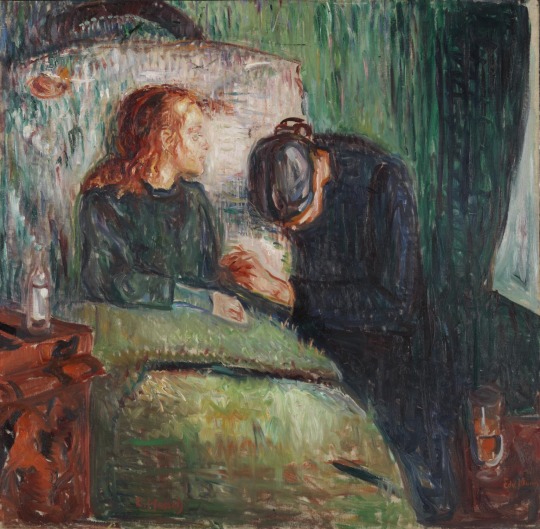


1. After My Brother’s Death, I Reflect on the Iliad - Elisa Gonzalez / 2. It - Stephen King / 3. The Sick Child - Edvard Munch / 4. The Sky Is Everywhere - Jandy Nelson / 5. Killing Flies - Michael Dickman
#the munch painting was inspired by the death of his sister#he was haunted by her death all his life & he painted a ton of variations of this#parallels#web weaving#web weave#words#poetry#art#elisa gonzalez#stephen king#edvard munch#jandy nelson#michael dickman
472 notes
·
View notes
Text

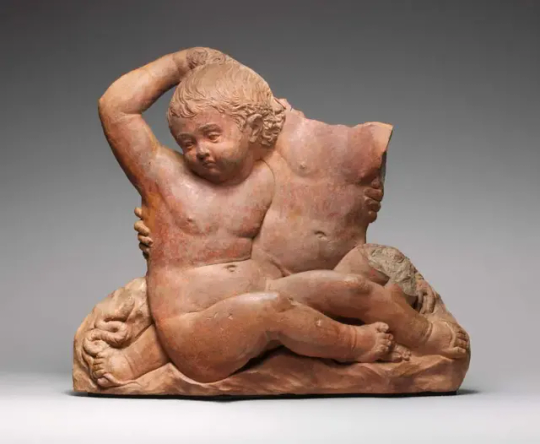




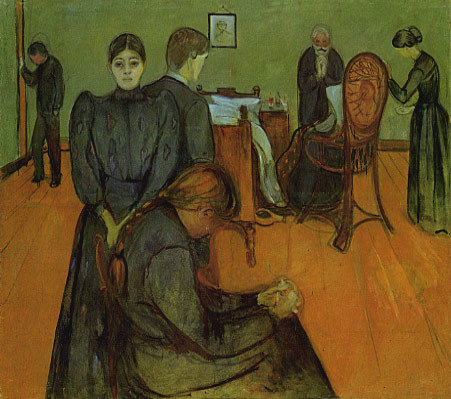






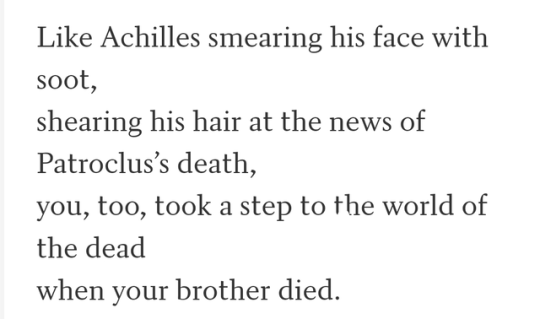




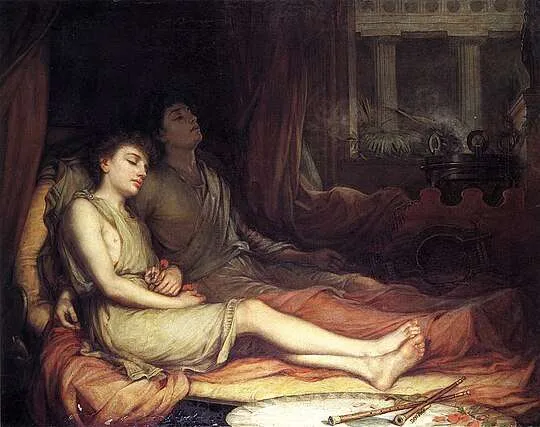

Dustin Pearson, The World at its Beginning / Iphicles Saved from a Serpent by his Brother Hercules / Diana Khoi Nguyen, Ghost Of / Maurice Sendak / Brenna Twohy, Swallowtail / Arcade Fire, Neighborhood #2 (Laika) / Edvard Munch, Death in the Sickroom / Michael Dickman, Killing Flies / Käthe Kollwitz, Woman with Dead Child / Michael Lassell, How to Watch Your Brother Die / Catherine Staples, Dear Henry / Lytras Nikephoros, Antigone and Polynices / Anne Carson, Antigonick / Elisa Gonzalez, After My Brother’s Death, I Reflect on the Iliad / John William Waterhouse, Sleep and His Half-Brother Death / Natalie Diaz, A Brother Named Gethsemane
on brothers and loss.
59 notes
·
View notes
Note
Oh my goodness okay there’s this poem that I’m pretty sure you shared a couple of months back and it was about grief and it was the one where it was a sibling mentioning that her younger brother had been shot and it was long-ish and I was wondering if you remembered what it was called? Has a repetitive line that you quoted in your tags something like “brother you have to believe me” or something?? I remember that much only. It came back to me suddenly and I just need it so so bad. Ty in advance for your help sorry to bother
YES it’s “After My Brother’s Death, I Reflect on the Iliad” by Elisa Gonzales and don’t apologize for bothering it was amazing to be reminded of this poem & to reread it again
144 notes
·
View notes
Text
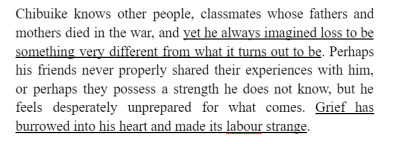
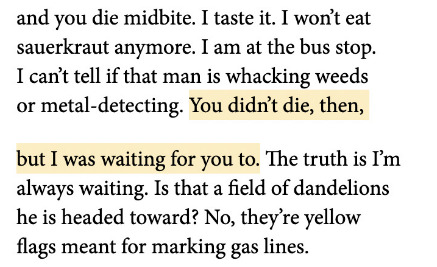



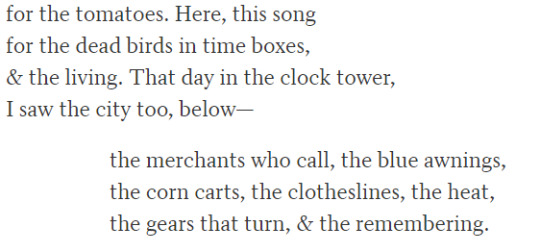

on loss and the mundane
Okechukwu Nzelu, here again now // Steven Espada Dawson, Elegy for Brian, My Brother Who Has Been Missing for Ten Years // my journal, june 2023 // Marie Howe, What the Living Do // Elisa Gonzalez, After My Brother’s Death, I Reflect on the Iliad // Zeina Hashem Beck, There, There, Grieving // Frank O’Hara, The Day Lady Died
8 notes
·
View notes
Text


after my brother’s death, i reflect on the iliad by Elisa Gonzalez
2 notes
·
View notes
Text

"You are the boy in the museum. You are the body consumed, ash."
-After My Brother's Death I Reflect on The Iliad (Elisa Gonzalez)
9 notes
·
View notes
Note
Hello my dear friend. I would like to ask a favor, would you know any poetry on the topic of siblings? I have experience more angst and anger and great sadness in my relationship with my younger sibling, younger brother. Many times I believe I’m overdramatizing and perhaps I am, but I cannot help it and feeling overwhelmed
I’m just not sure if anyone else has the same struggles (I am the eldest, I am female. #eldestdaughtersyndrome)
hi there! as an eldest daughter with two younger brothers i can relate. it's not always easy. i can't really think of many poems that center a sibling dynamic except 'after my brother's death, i reflect on the iliad' by elisa gonzales.... but here is a collection of quote and poem fragments about siblings someone compiled. really sorry i can't be of more help </3
#maybe people who can think of something can add it in the notes???#i am manifesting the best of days for you anon#anon#answer
6 notes
·
View notes
Photo

— “After My Brother’s Death, I Reflect On the Iliad” by Elisa Gonzalez
6 notes
·
View notes
Text
You are dead at twenty-two. As I rinse dishes,
fumble for my keys, buy kale and radishes,
in my ear Priam repeats, 'I have kissed the hand
of the man who killed my son.'
Would I do that?
I’ve studied the mugshot of the man who killed you;
I can imagine his hands.
Of course I would. Each finger, even.
To hold your body again. And to resurrect you?
Who knows what I am capable of.
Nights, I replay news footage:
your blood on asphalt, sheen behind caution tape.
Homer’s similes, I’ve been told, are holes cut in the cloth
between the world of war and another, more peaceful world.
On rereading, I find even there, a man kills his neighbor.
'Let Achilles cut me down, as soon as I have taken
my son into my arms and have satisfied my desire for grief'
— this, my mind’s new refrain
in the pharmacy queue, in the train’s rattling frame.
Brother. Listen to me plead for your life
though even in the dream I know you’re already dead.
How do I ensure my desire for grief is never satisfied?
Was Priam’s ever?
"After My Brother’s Death, I Reflect on the Iliad," Elisa Gonzalez
2 notes
·
View notes
Note
Hi!! Wondering if you have any recs for poetry about siblings? Have an awesome day <33
Thank you, sweetheart, you too! 🌼
poetry recommendations
In Praise of My Sister by Wisława Szymborska
My Brother at 3 A.M. by Natalie Diaz
The Hinge by Cynthia Cruz
The Sister Karamazov by Katie Hartsock
Elegy for My Sister by Sherod Santos
Green, Green is My Sister’s House by Mary Oliver
After My Brother’s Death, I Reflect on the Iliad by Elisa Gonzalez
What the Living Do by Marie Howe
360 notes
·
View notes
Text
just listened to a recording of elisa gonzalez reading “after my brother’s death, i reflect on the iliad” and immediately burst into tears
0 notes
Text
vaguely embarrassed to be linking very beautiful poetry with minecraft roleplay. that being said once a month i think about “after my brother’s death, i reflect on the iliad” by elisa gonzalez + c!crimeboys while wilbur is dead about once a month and it drives me crazy wazy . i mean the poem itself drives me insane on its own but every once in awhile it gets additional spice.
#also my brother out of rehab points by ron riekki + revivebur/tommy#anyway. this is for the minecraft girlies who want to be fucking insane about poetry with me#please reach out in these trying times
1 note
·
View note
Text
cannot stop thinking about after my brothers death i reflect on the iliad.....
#dellete#plead for your life though even in the dream i know youre already dead#my god that was potent#what a stunning piece of work
1 note
·
View note
Text
Anonymous asked: I really enjoyed your book review of Sebastian Junger’s Homecoming. Perhaps enjoyment isn’t the right word because it brought home some hard truths. Your book review really helped me understand my older brother better when I think back on how he came home from the war in Afghanistan after serving with the Paras and had medals pinned up the yin yang. It was hard on everyone in the family, especially for him and his wife and young kids. He has found it hard going. Thanks for sharing your own thoughts as a combat veteran from that war. Even if you’re a toff you don’t come across as a typical Oxbridge poncey Rupert! As you’re a classicist and historian how did ancient soldiers deal with PTSD? Did the Greeks and Roman soldiers even suffer from it like our fighting boys and girls do? Is PTSD just a modern thing?
See previous post for Part 1. Part 2 of my answer here below....
But does it mean no Greek or Roman soldier ever suffered trauma or mental illness? Is there nothing we can’t learn from them? Of course not. Both the Greeks and Romans can teach us a lot about suffering.

Both cultures recognised the importance of integrating soldiers back into society that were they had tried to defend on the battlefield. And I think we can learn a lot from them in the regard.
If we are able to accept that PTSD is not a product of mechanised warfare and very likely did occur in ancient societies, then the question should be asked: how did ancient cultures deal with individuals who experienced trauma and suffering? We know that exposure to violence occurred. And we know, too, that homecoming was a common experience, in that some type of military service was a regular feature of the cursus honorum for those in the senatorial class and was an avenue for the lower classes seeking advancement. Valour in combat was respected, and it was not unusual, when in pursuit of higher office or defending oneself at trial, to display one’s scars from battle as a physical witness of character.
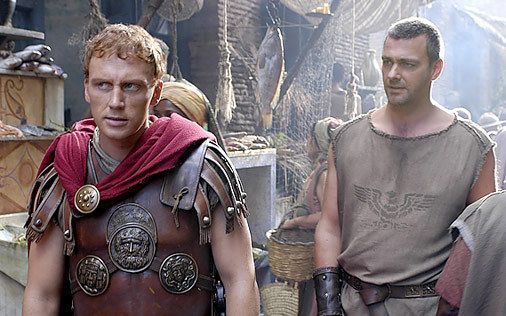
Inscriptions inform us that many veterans pursued successful careers upon their return, becoming leading men in their cities. We know that they feared war and respected it, we know that they used ritual to distinguish war from peace, but we do not know how these men fared emotionally and psychologically after long exposure to violence.
While many ancient cultures were able to recognise the significant changes in soldiers following a battle, the precise reasons as to what created these changes were elusive. A common explanation was that the occurrence of (what I describe as) PTSD was caused by the actions of malevolent ghosts or spirits of those who were killed in battle and now sought vengeance on their killer. While it is unlikely that a vengeful spirit explanation is correct, it does contain the insight that the sickness originated from an inward or unseeable wounding, and these invisible wounds could be just as deadly as any outward wound.

Many ancient cultures sought to deal with and create specific rituals to heal the unseeable and drive off the ghosts who caused them. The central purpose of these often culturally unique rituals was to welcome the returning soldier back into society and allow for the release of trauma. The Romans directed the Vestal Virgins to bathe returning soldiers, purging them of the corruption of war.
While the plethora of writings describing PTSD-like signs in ancient veterans indicate that these rituals did not always work, given the sheer numbers of ancient soldiers who went into battle and through these rituals, it would seem likely that for many something about them did work. However, it might not have been the welcome back into society alone that worked.
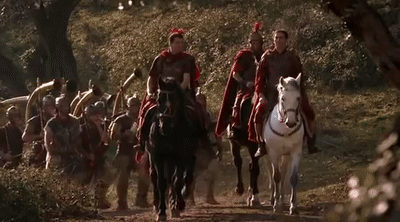
What might have been even more important, and what is often overlooked, was that the reintegration process would begin in the aftermath of the battle when the survivors began to walk home. Given that ancient soldiers sometimes fought far from their homeland, when the war was over they had to the walk home. The speed of this return was dictated by the pace of the slowest pack animals and the slow pace, while frustrating, may well have given the soldiers much needed time to reflect upon what they had experienced, grieve for comrades lost and perhaps find solace in a shared group experience. The long march back culminated in a ritual cleansing and a return to home, as mentioned above.
One of the reasons this slow decompression might have aided the efficacy of the return rituals can be seen in its complete opposite in contemporary conflict, where the advent of improved transport has made it possible to move troops quickly and efficiently. Perhaps too quickly and too efficiently. While troops might be happy to be back at home far more quickly, there might be a lost opportunity for soldiers to properly process what they have seen and experienced within a like-minded group.
I believe that we must be cautious when we map the past too neatly upon our own experiences or, conversely, our own experiences too neatly upon the past. While there are similarities and continuities, the relationship between ancient and modern must be carefully parsed. All lovers of the classical past are familiar with how the study of the Greeks and Romans awakens profound and contradictory feelings of identification and alienation. With respect to combat trauma, the shock felt by a modern soldier upon seeing a corpse for the first time would have been incomprehensible to both the Greeks and the Romans, who were surrounded by death.

Likewise, modern technology – with its distant, impersonal, and terrifyingly effective weapons, its instantaneous communication between home front and front line, and the speed of return from combat – requires an adaptability and an ability to get one’s head around big spaces and multiple actors that would never have been demanded from a Roman legionary.
My own view is that our soldiers actually face more complicated psychological factors than did the Romans – including a populace that largely avoids the realities of war while still wishing to enjoy the profits of it.
In addition, as our understanding of what causes PTSD grows we may find a paradox: distance weapons, developed to provide overwhelming military superiority and to shield troops from the fear and horror of close combat, may in fact cause more trauma, whether owing to the shockwaves they send through the brain or to the sense of helplessness they engender.
Moreover psychologists believe that modern PTSD cases are the result of the loss of ‘ontological security’ – ‘an individual’s inability to reconcile their traumatic memories with their moral codes, self-concepts, beliefs about human nature and notions of cosmic justice through which they seek to impose what anthropologists call a sense of order and meaning on the world. The psychological conflict arising from trauma ensures that the trauma lives on as ‘a source of socially and psychologically maladaptive behaviour’. But - and here’s the crux of it - the definition of what is a traumatic memory is as variable as the sufferer is individual, and this is culturally dependent even in the most homogenous societies.

Where we can learn from the Greeks and Romans is how they dealt with homecoming and using religious spirituality to balm emotional wounds.
For the Greek warrior, Classical Greek culture, like that of Rome after them, practiced polytheism, the expression of which included confirmatory and transformatory rituals. Ritual purification with water occurred in Greek funeral rites, with indication that pollution associated itself suggest that the cleansing had anything to do with establishing proper relationship to the gods, but may have had a purely “practical” force.
A more important spiritual concept to the Greek soldier than that of pollution may have been that of the necessary separation between the warrior’s life and the domestic life. In ancient and classical Greece, city walls held a religious significance as the separation between the sacred and the profane, for inside the walls are the sanctuary and security of domestic peace, while outside the walls warfare and the domestic life from which the warriors of his tale are separated, evoking pathos in the listener; the Iliad’s action describes the soldierly activities and battles of the Greeks and Trojans, while Homer’s metaphors describe the everyday activities which the Greeks have left behind and with living relatives as well as physical location.
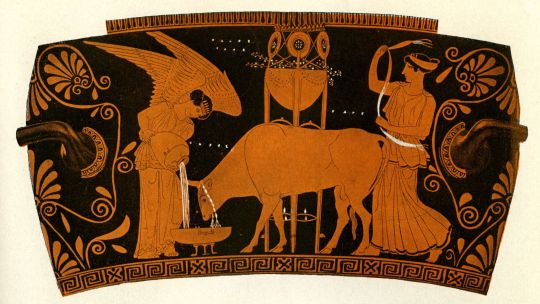
Some Classicists believe there is little evidence to suggest that the cleansing had anything to do with establishing proper relationship to the gods, however. Furthermore, a Greek male’s citizenship was based on his membership in his city’s fighting force, his τιμή, honour, was directly related to his performance in the line of duty, and “a purely predatory attitude toward the lives and possessions of one’s enemies was an essential part of archaic and classical Greek warfare. This attitude toward battle makes it unlikely that Greek soldiers would have felt any sense of pollution either from warfare or the soldier’s association with, or proximity to, death or blood; cleansing rites were likely observed for fallen comrades and camps, but may have had a purely “practical” force.
A more important spiritual concept to the Greek soldier than that of pollution may have been that of the necessary separation between the warrior’s life and the domestic life. In ancient and classical Greece, city walls held a religious significance as the separation between the sacred and the profane, for inside the walls are the sanctuary and security of domestic peace, while outside the walls exists the world in which warfare and strife takes place.
In the Iliad, Homer makes extensive use of metaphor to juxtapose the world of warfare and the domestic life from which the warriors of his tale are separated, evoking pathos in the listener; the Iliad’s action describes the soldierly activities and battles of the Greeks and Trojans, while Homer’s metaphors describe the everyday activities which the Greeks have left behind and been separated from for ten years, such as women sewing and farmers reaping.
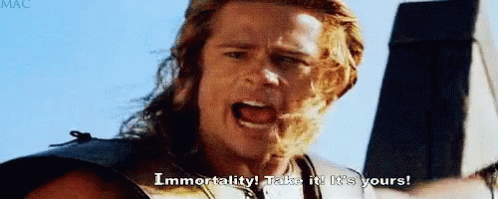
The soldier may accumulate honour in battle, but he is acutely aware of what he is sacrificing, even if only temporarily, to gain that honour. Homer’s Odyssey and Aeschylus’ Agamemnon are explorations of difficulties the Greek warrior faced as he attempted to return to domestic life after long absence in war. The concept of such separation may have had a sacred significance akin to the idea of the separation of domestic and non-domestic spaces established by walls; it was at least culturally significant to the Greeks of Homer’s and Aeschylus’ times.
Though Greek soldiers may not have had purification rituals to cleanse themselves after battle, Shay proposes that warriors of certain Greek societies, at least, had a form of transformatory, religiously-significant ritual which served to reintegrate them into domestic society after long separation in mandatory military service and, for most, exposure to combat. He writes, “The performances of Athenian tragic theatre - which was a theatre of combat veterans, by combat veterans, and for combat veterans - offered cultural therapy, including purification...The ancient Athenians had a distinctive therapy of purification, healing, and reintegration of returning soldiers that was undertaken as a whole political community. Sacred theatre was one of its primary means of reintegrating the returning veteran into the social sphere as “citizen.”
Shay proposes that soldiers hearing or reciting the Iliad would also have experienced a similar sacred catharsis; thus, this might have been one reason for the works’ significance in Greek culture.

What of the warrior of Imperial Rome? What of homecoming and religion?
Religion was likewise both a public and private affair during Imperial Rome.
Political leaders and military officials were also religious leaders, and the people considered the emperor god-like, if not a god, within one of Rome’s many public cults. Ritual practices were integral to both state and private religion. The Romans accepted that the safety and prosperity of their communities depended upon the gods, whose favour was won and held by correct performance of the full range of cult practices inherited from the past. Bargaining rituals, in which a specific ritual action was performed or promised in return for fulfillment of prayer, as well as confirmatory and transformatory rituals, were common throughout the Roman Empire’s many public and private religious cults.
Within this cultural context, Rome allowed her soldiers to practice in accordance with individual religious beliefs, and the army took part in public religious activities. Among many other state religious rituals, Roman armies underwent ritual purification (known as lustratio exercitus, translating literally as ‘the purification of the army’), sometimes before battle, sometimes after (or sometimes both). This ritual may also have been performed on the Campus Martius (the sacred field dedicated to the Roman god of war, Mars) at the start and end of the military campaign season.
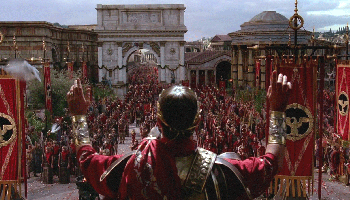
The Roman practice of leading a victorious army under a triumphal arch may also have been a ritual purification; soldiers decorated themselves and their standards for both rituals with laurel, a plant commonly used for purification in other aspects of Roman culture.
Scholars disagree as to the purpose of the purification ritual and the sacred nature of an army’s triumph. Pritchett suggests that Roman generals conducted the lustratio exercitus in order “to remove superstitious dread” from the soldiers before battle. Some scholars argue that the purification ritual was not merely to remove dread before battle, but may have included the use of laurel to “cleanse the army of its bloodshed.” In common with the Greeks, Roman soldiers were unlikely to attach any moral disapprobation to the act of killing itself, or find war immoral. But the performance of the ritual after battle and at the close of the warrior’s season indicate the Romans may have felt that some incidental, religious pollution attached itself to the army or the soldier from nearness to death or blood.
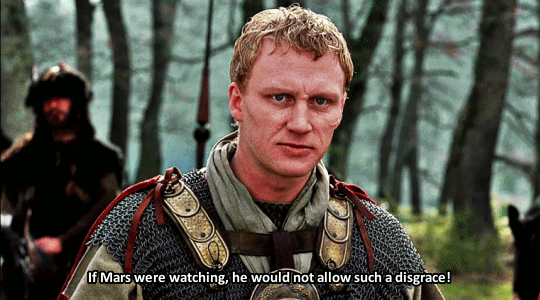
As some point out, Virgil in his imperial epic poem, The Aeneid, supports the idea that the imperial Romans saw some impurity associated with the individual’s presence in combat - Aeneas, having just taken part in battle, states that he must purify himself before approaching his household gods. Others sees the act of battle as a sacred undertaking; therefore, at the end of the campaign season, the soldiers ritually desacralised themselves and also cleansing themselves for their acts of violence in battle.
This idea further suggests a sacred distinction between the warrior and the non-warrior, as the warrior undertook a particular religious duty by fighting which the non-warrior did not. The ceremony performed at a Roman soldier’s retirement, when the emperor, or his proxy, would perform a ritual releasing the soldier from the religious oath he took upon joining the army, transitioning him back into private life, seems to suggest this as well.
These ritual purifications may also have marked the transition for the soldier from chaos back to order. Roman society placed high value on order and Rome’s citizens saw the empire as a civilizing force against the barbaric chaos of other peoples; for them, Roman conquest brought law public order, and structure to uncivilized barbarians as much as it did land and treasure to Rome.
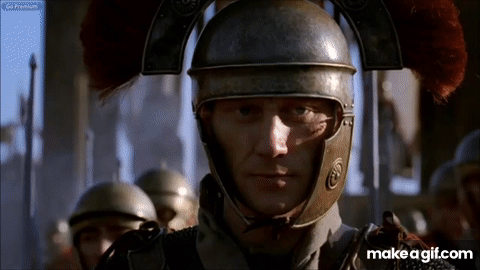
The division between what was civilised (Rome) and was chaotic (barbarians, and thus anyone Rome was at war with) was sacred and sharp, and it was the Roman army which crossed that line to carry order to the peoples of the world. The presence of the ritual after battle and after the campaign season may mark a restorative or transitional moment in which the soldier’s association with chaos in battle against an uncivilized enemy ends and he returns to the orderly world of Roman civilisation.
While no absolute solution can be drawn from the experiences of ancient soldiers, there may be sufficient clues to warrant studying what benefits might be gained from delaying the return of groups of individuals from conflicts in a structured manner, thereby lessening the propensity for PTSD to occur. Particularly, if it were possible to enact rituals of our own - rituals which recognise and free returning soldiers from their traumas and assuage any sense of guilt and culpability - and reinforce that society values them for what they did, we may be better able to deal with PTSD.
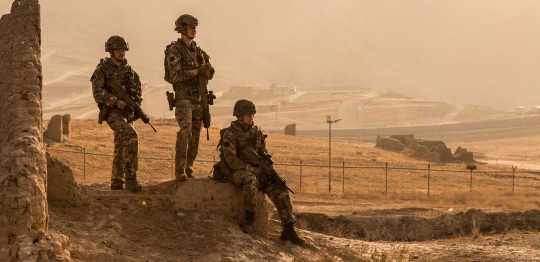
Indeed whatever the causes or effects of PTSD suffered by returning service personnel, homecoming is crucial to integrating that person back into his/her family, community, and society. Earlier I talked about research done on British, European and American returning soldiers and the wide discrepancies between the European and the American experience of dealing with PTSD and reintegration.
I think one reason why British soldiers fared better than our American brethren is we had more effective mental health tools and mechanisms in place. I’m sure your brother as he was with the Parachute regiment would have gone through the TRiMS and TLD programme as a way for returning British soldiers to process their tour experience before being allowed back into the fold. It doesn’t work for everyone but certainly catches more in the supportive net who otherwise might have profound difficulties ‘coming home’.

For those who don’t know since 2007 the British armed services have been using the Trauma Risk Management program (TRiM) and the practice of soldiers spending time in a “third location decompression” (TLD) to help the process of homecoming as well as detect early warnings of PTSD. Both have been important tools for British soldiers to process their emotions and experiences.
The good thing about TRiM is that it’s a peer support system designed to assess trauma experienced by soldiers and encourage them to seek help if needed. TLD requires its participants to spend 36 hours in a location away from combat before returning home, often on the bases in Cyprus within the British Sovereign Territory there. Both of these mitigation measures focus on unit or regimental cohesiveness, which is has been well proven to be associated with lower levels of common mental disorders and PTSD. The aim of decompression is to ensure everyone gets a proper mental health briefing and that they are able to speak informally to each other without being judged. In the end it’s an invaluable opportunity to access the social support needed and begin the reintroduction to ‘normal life’.
Of course no system is perfect - look how sprawling the British veteran charities are for instance (Royal British Legion, Poppy Scotland, Combat Stress, Connect Assist, the Ministry of Defence, SSAFA etc) with over 2000 registered veteran charities which leads to confusion about services and support. No measure that is put in place can treat every single soldier but every little bit helps more than it hinders a soldier’s return ‘home’.
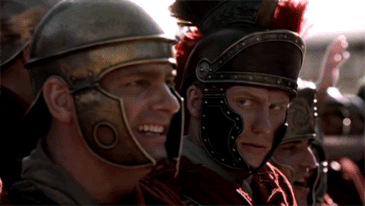
In the end to wheel back to your question, the issue of whether the Romans suffered PTSD is probably unanswerable, because the problem itself exposes many of the challenges posed by the historical study of the past.
I do know that the view that the Graeco-Roman world knew PTSD is fast becoming dogma because of popular culture and trendy lefty academic fads in English departments. I find that troubling speaking as both a combat veteran and as a Classicist.
In this debate of nature versus nurture it can hardly be reasonable to conclude that a legionary would have experienced trauma in the same way as a modern day combat veteran – surely his vastly different upbringing, cultural background and combat experience would have resulted in a culturally unique variant of response to that trauma? So to state that the legionary *must* have suffered PTSD seems simplistic and poorly evidenced. Saying a Greek or Roman soldier’s exposure to close combat and the fact that war is hell wherever and whenever it is fought is not enough. Some men would undoubtedly have experienced trauma induced psychological disorder but what that response was, its nature, causes, symptoms, is simply impossible to know, given the current paucity of relevant sources.
Perhaps when we understand PTSD better we’ll have an ability to interpret that thin evidence and put it into a cultural and medical frame of reference - despite wildly different causal factors and conditioning to meet the unique stressors in each of the ancient and modern soldier’s experience of warfare - that will get us close to a definitive answer. Indeed, as we learn more about concussive brain injuries and slowly unravel the various causes of PTSD, I suspect that we may find the evidence will point to a lower frequency of PTSD in the ancient world than that experienced by our troops in the present day. Until then, to be honest, it’s a game of grim conjecture.
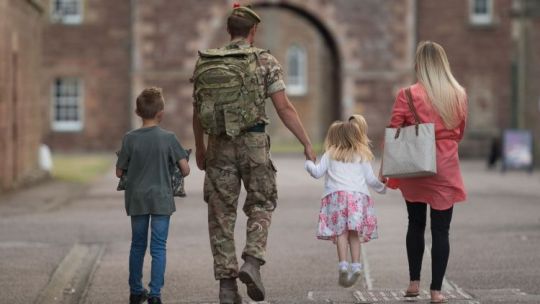
If your brother needs more help please DM me and we can discuss ways in which we can help him find the right fit. You already know about the paras own charity for its veterans, Support Our Paras, so nothing I can add there that you don’t already know. My one recommendation would be to reach out to ex-Para and UK SFSG (special forces operator), Dave Radband. Radders is good egg and has used social media to become an outstanding mental health advocate for ex-British veterans.
Once again my apologies for the long answer in two parts but it’s an issue that’s very close to my heart when I think of my own fortunate homecoming from war and I remember those who didn’t come home...and those still fighting the war after they come home.
Thanks for your question.
#question#ask#PTSD#war#rome#greece#antiquity#spartan hoplite#roman legionary#soldier#depression#mental health#warfare#ancient warfare#shell shock#killing#culture#society#classical#mental illness#homecoming#british#british army
94 notes
·
View notes